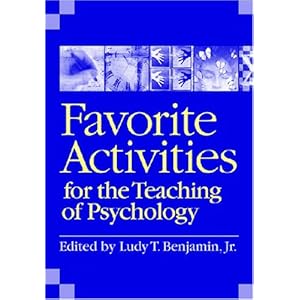Steve Jones originally posted this, but it bears repeating given the new teachers of psych joining our ranks every year.
=======================================================================
If you or someone you know will be teaching high school psychology for the first time and don't know where to begin, THIS is the place! Below is a list of steps (modified from a post I (Steve) made to the AP Psych e-mail list earlier this year) that you want to take NOW so that you are ready to come out swinging when your school year begins:
Welcome new psychology teacher! Congratulate yourself on finding/stumbling on/being forced to teach the best class in high school!
There is an abundance of materials out there so you don't have to reinvent the wheel your first year (although you should feel free to after that). Here are some of the best resources to start with:
1)
TOPSS which stands for Teachers of Psychology in Secondary Schools and is part of the American Psychological Association. Join TOPSS and you become an affiliate member of the APA at a fraction of the cost that other professionals pay, only $40 per year. TOPSS has lesson plans for every unit of the high school psych course and is in the process of revising older units so that the lesson plans remain vital and useful. They're created by high school teachers and are edited by psych professors. There's also a quarterly newsletter, the Psychology Teachers Network, and an annual conference for high school teachers at Clark University. Finally, and maybe most importantly, the APA and TOPSS have created the National Standards for High School Psychology. The first version of standards was created in 2005 and the newest version of the standards are being revised and should be out soon. (Full disclosure: I'm currently a member-at-large for the TOPSS Board.)

2) The College Board. Even if you don't teach AP Psychology this is a great resource -- and if you do, it's terrific! Here are some pages to start with.
a)
The AP Psych home page
b)
The course description (aka the Acorn Book, in PDF)
c)
The AP Psych teachers guide -- written by Kristin Whitlock, this thing is a beauty and a GREAT place to get started if you're new to the course (also in PDF)
d)
Old AP Psych exam questions
e)
AP Psych store - you'll want to buy the 2004 and 2007 released exam multiple choice questions at some point
3) Teaching psychology activity books. These were compiled by Ludy Benjmin et al. and have a wide variety of activities for intro psych courses. Some are hits and some are misses (in my opinion) so you might want to buy one and see what you think.
Here are several to try.
4)
Forty Studies that Changed Psychology. An excellent overview that will be invaluable to you if you're just getting started, and is often used by many AP Psych teachers during the year or as a summer assignment.
5) The publisher of your textbook. Find out what book you'll be using, then contact the publisher and get in touch with the high school representative for psychology. They are usually very helpful and can give you an idea of what might be available for you for free. A great tip from Michael Donner on the AP Psych list is to contact a publisher of another psychology textbook and see if you can get an exam copy of that book (or even find a used copy online). A second book can be very helpful for helping you come up with alternate examples or explanations for your students.
6) The
National Council for the Social Studies Psychology Community. This group is part of NCSS and helps psychology teachers in many ways, including annual presentations at the NCSS conference, newsletters and more. You can e-mail chair Daria Schaffeld at daria.schaffeld AT d214.org to get a copy of the latest newsletter.
7) Your fellow teachers! If you know others in your district or region who teach psych, contact them and ask for help. Most psychology teachers are still the only ones in their school, so getting in touch with folks who are nearby and are willing to share can be immensely helpful. Or join an e-mail list for psychology teachers such as Psych-News, TIPS or PsychTeacher (see a full list
here) and make connections all over the world!
8) A final rec and plug: this Teaching High School Psychology blog which is run by Kent Korek, Chuck Schallhorn, Rob McEntarffer, Trevor Tusow and myself. It's a site for us to just share with our fellow teachers the things that we like, find interesting, have questions about, etc. Follow us via e-mail so you are notified every time we post something new, in your RSS reader or just bookmark us and visit when you can. You can also follow me (Steve) on Twitter at
@highschoolpsych.
One final bit of advice: Psychology is a science. It doesn't matter what your background is as long as you're willing to embrace the scientific perspective and run with it. Have fun and enjoy teaching psychology!
--posted by Steve













